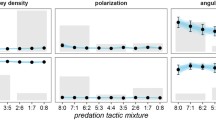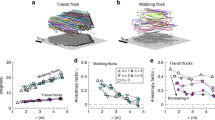Abstract
There is a strong body of evidence that patterns of collective behaviour in grouping animals are governed by interactions between small numbers of individuals within the group. These findings contrast with study of the ‘selfish herd’, where increasingly complex individual-level movement rules have been proposed to explain the rapid increase in aggregation observed when prey groups are startled by or detect a predator. While individuals using simple rules take into account the position of only a few neighbours, those using complex rules incorporate multiple neighbours, and their relative distance, to determine their movement direction. Here, we simulate the evolution of selfish herd behaviour to assess the conditions under which simple and complex movement rules might evolve, explicitly testing predictions arising from previous work. We find that complex rules outperform simple ones under a range of predator attack strategies, but that simple rules can fix in populations particularly when they are already in the majority, suggesting strong positive frequency dependence in rule success. In addition, we explore whether a movement rule derived from studies of collective behaviour (where individuals use the position of seven neighbours to determine movement direction) performs as successfully as more complex rules, finding again positive frequency dependence in rule success, and a particular role for predator attack strategy (from within or outside the group).



Similar content being viewed by others
References
Ballerini M, Cabibbo N, Candelier R et al (2008a) Interaction ruling animal collective behavior depends on topological rather than metric distance: evidence from a field study. Proc Natl Acad Sci 105:1232–1237. doi:10.1073/pnas.0711437105
Ballerini M, Cabibbo N, Candelier R et al (2008b) Empirical investigation of starling flocks: a benchmark study in collective animal behaviour. Anim Behav 76:201–215. doi:10.1016/j.anbehav.2008.02.004
Bialek W, Cavagna A, Giardina I et al (2012) Statistical mechanics for natural flocks of birds. Proc Natl Acad Sci USA 109:4786–4791. doi:10.1073/pnas.1118633109
Biro D, Sumpter DJT, Meade J, Guilford T (2006) From compromise to leadership in Pigeon Homing. Curr Biol 16:2123–2128. doi:10.1016/j.cub.2006.08.087
Bode NWF, Faria JJ, Franks DW et al (2010) How perceived threat increases synchronization in collectively moving animal groups. Proc R Soc B Biol Sci 277:3065–3070. doi:10.1098/rspb.2010.0855
Bode NWF, Franks DW, Wood AJ (2011a) Limited interactions in flocks: relating model simulations to empirical data. J R Soc Interface 8:301–304. doi:10.1098/rsif.2010.0397
Bode NWF, Wood AJ, Franks DW (2011b) Social networks and models for collective motion in animals. Behav Ecol Sociobiol 65:117–130. doi:10.1007/s00265-010-1111-0
Buhl J, Sumpter D, Couzin I et al (2006) From disorder to order in marching locusts. Science 312:1402–1406
Buhl J, Sword GA, Clissold FJ, Simpson SJ (2011) Group structure in locust migratory bands. Behav Ecol Sociobiol 65:265–273. doi:10.1007/s00265-010-1041-x
Codling EA, Pitchford JW, Simpson SD (2007) Group navigation and the “many-wrongs principle” in models of animal movement. Ecology 88:1864–1870. doi:10.1890/06-0854.1
Couzin I, Krause J (2003) Self-organization and collective behavior in vertebrates. Adv Study Behav 32(32):1–75
Davies NB, Krebs JR, West SA (2012) An introduction to behavioural ecology, 4th edn. Wiley-Blackwell, Chichester
De Vos A, O’Riain MJ (2012) Movement in a selfish seal herd: do seals follow simple or complex movement rules? Behav Ecol. doi:10.1093/beheco/ars153
Faria JJ, Codling EA, Dyer JRG et al (2009) Navigation in human crowds; testing the many-wrongs principle. Anim Behav 78:587–591. doi:10.1016/j.anbehav.2009.05.019
Foster W, Treherne J (1981) Evidence for the dilution effect in the selfish herd from fish predation on a marine insect. Nature 293:466–467
Giardina I (2008) Collective behavior in animal groups: theoretical models and empirical studies. HFSP J 2:205–219. doi:10.2976/1.2961038
Hamilton W (1971) Geometry for the selfish herd. J Theor Biol 31:295–311
Hancock PA, Milner-Gulland EJ, Keeling MJ (2006) Modelling the many-wrongs principle: the navigational advantages of aggregation in nomadic foragers. J Theor Biol 240:302–310. doi:10.1016/j.jtbi.2005.09.019
Hildenbrandt H, Carere C, Hemelrijk CK (2010) Self-organized aerial displays of thousands of starlings: a model. Behav Ecol 21:1349–1359. doi:10.1093/beheco/arq149
Huth A, Wissel C (1992) The simulation of the movement of fish schools. J Theor Biol 156:365–385
Huth A, Wissel C (1994) The simulation of fish schools in comparison with experimental data. Ecol Modell 75:135–146
James R, Bennett P, Krause J (2004) Geometry for mutualistic and selfish herds: the limited domain of danger. J Theor Biol 228:107–113
Katz Y, Tunstrom K, Ioannou CC et al (2011) Inferring the structure and dynamics of interactions in schooling fish. Proc Natl Acad Sci USA 108:18720–18725. doi:10.1073/pnas.1107583108
Kimura M (1962) On the probability of fixation of mutant genes in a population. Genetics 47:713–719
King AJ, Wilson AM, Wilshin SD et al (2012) Selfish-herd behaviour of sheep under threat. Curr Biol 22:R561–R562. doi:10.1016/j.cub.2012.05.008
Krakauer D (1995) Groups confuse predators by exploiting perceptual bottlenecks: a connectionist model of the confusion effect. Behav Ecol Sociobiol 36:421–429
Krause J, Ruxton G (2002) Living in groups. Oxford University Press, Oxford
Krause J, Tegeder R (1994) The mechanism of aggregation behaviour in fish shoals: individuals minimize approach time to neighbours. Anim Behav 48:353–359
Miller R (1922) The significance of the gregarious habit. Ecology 3:122–126
Morrell LJ, James R (2008) Mechanisms for aggregation in animals: rule success depends on ecological variables. Behav Ecol 19:193–201
Morrell LJ, Romey W (2008) Optimal individual positions within animal groups. Behav Ecol 19:909–919. doi:10.1093/beheco/arn050
Morrell LJ, Ruxton GD, James R (2011a) The temporal selfish herd: predation risk while aggregations form. Proc R Soc B Biol Sci 278:605–612. doi:10.1098/rspb.2010.1605
Morrell LJ, Ruxton GD, James R (2011b) Spatial positioning in the selfish herd. Behav Ecol 22:16–22. doi:10.1093/beheco/arq157
Morton T, Haefner J, Nugala V et al (1994) The Selfish Herd revisited: do simple movement rules reduce relative predation risk. J Theor Biol 167:73–79
R Development Core Team (2011) R: a language and environment for statistical computing. R Foundation for Statistical Computing, Vienna, Austria. ISBN 3-900051-07-0, URL http://www.R-project.org/. (last accessed 21 October 2014)
Reluga T, Viscido S (2005) Simulated evolution of selfish herd behavior. J Theor Biol 234:213–225
Roberts G (1996) Why vigilance declines as group size increases. Anim Behav 51:1077–1086
Simons A (2004) Many wrongs: the advantage of group navigation. Trends Ecol Evol 19:453–455
Spieler M, Linsenmair K (1999) Aggregation behaviour of Bufo maculatus tadpoles as an antipredator mechanism. Ethology 105:665–686
Turner G, Pitcher T (1986) Attack abatement: a model for group protection by combined avoidance and dilution. Am Nat 128:228–240
Viscido S, Wethey D (2002) Quantitative analysis of fiddler crab flock movement: evidence for “selfish herd” behaviour. Anim Behav 63:735–741
Viscido S, Miller M, Wethey D (2002) The dilemma of the selfish herd: the search for a realistic movement rule. J Theor Biol 217:183–194
Watt P, Nottingham S, Young S (1997) Toad tadpole aggregation behaviour: evidence for a predator avoidance function. Anim Behav 54:865–872
Wood A, Ackland G (2007) Evolving the selfish herd: emergence of distinct aggregating strategies in an individual-based model. Proc R Soc B Biol Sci 274:1637–1642
Acknowledgments
Paul Bennett and Dick James wrote the original code on which this work was based, Steve Moss assisted with additional programming, and Dick James provided useful discussions.
Author information
Authors and Affiliations
Corresponding author
Rights and permissions
About this article
Cite this article
Morrell, L.J., Greenwood, L. & Ruxton, G.D. Consequences of variation in predator attack for the evolution of the selfish herd. Evol Ecol 29, 107–121 (2015). https://doi.org/10.1007/s10682-014-9743-6
Received:
Accepted:
Published:
Issue Date:
DOI: https://doi.org/10.1007/s10682-014-9743-6




